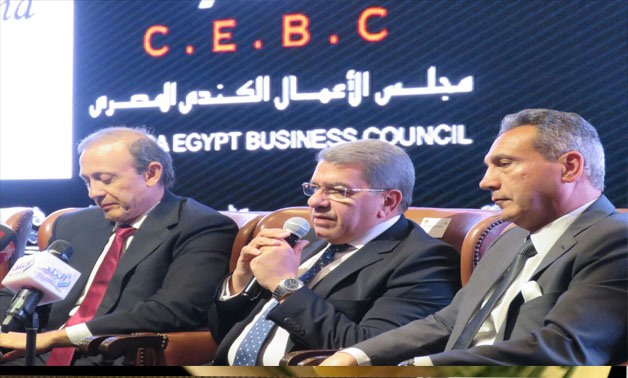
Finance Minister Amr el-Garhy addressing the Canada Egypt Business Council - Press photo
CAIRO – 1 May 2018: The decline in inflation rates by around one percent on a monthly basis over the past four months reflects the improvement in the economic situation, Finance Minister Amr el-Garhy said on Tuesday.
He added that it also reflects stability in commodity prices, which were largely impacted by the flotation of the Egyptian pound in late 2016.
Addressing the Canada Egypt Business Council, Garhy said that the government is
working on achieving a seven percent growth rate on the long term, which will help create jobs and therefore achieve social justice.
The government also aims to reduce budget deficit to 8.4 percent of GDP in the new fiscal year and to achieve a primary surplus, paving the way for curbing foreign debt to reach 75 percent of GDP by 2022, Garhy said.
He added that there are pressures on the fiscal policy as state expenditures are bigger than its revenues, a matter that needs careful management and a tightened budget deficit.
As for the Finance Ministry’s efforts to increase tax revenues, Garhy said that the ministry is currently working on expanding the tax base and enhancing the efficiency of tax collection.
Tax revenues in the current fiscal year constituted 14.25 percent of GDP, with a target to increase this figure to 17 percent over the next four years, Garhy said, adding that this will help in reducing budget deficit by around four percent by 2022.
Egypt is targeting over LE 610 billion in tax collection, including customs, in the current fiscal year, Garhy said.
Tax revenues in the previous fiscal year 2016/17 increased 31.8 percent year-on-year, mainly driven by value-added tax (VAT) collection.
As part of Egypt’s reform program, the country started implementing VAT, replacing the sales tax. In July 2017, a 14 percent VAT was implemented, up from 13 percent the year before, when the VAT was first introduced.
The Finance Ministry is targeting a 22-24 percent year-on-year increase in tax collection in the coming 2018/19 fiscal year. It announced in January that tax revenues in the first half of the current fiscal year rose by 62 percent to reach LE 249 billion.
As for the oil and gas, Garhy said that after 2010, Egypt saw a decline in its oil and gas production, causing a gap between production and consumption that was covered by imports.
However the recent gas discoveries, Garhy said, has largely improved the situation.
The new gas discoveries, including the giant Zohr gas field, are expected to turn Egypt into a net exporter of natural gas from a net importer.
Egypt plans to stop importing liquefied natural gas (LNG) by the end of the 2017/18 fiscal year ending in June as it accelerates production at a number of newly-discovered gas fields.
Garhy further said that the government is keen on developing the industrial sector, despite the strained budget.
He said that industry in Egypt started to improve gradually, adding that the investment law offers tax exemptions for industrial projects that range from 50-80 percent.
Comments
Leave a Comment